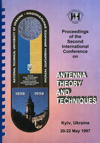Projective approach to joint detection and estimation of signals masked by sea-clutters in surface-wave over-the-horizon radar
DOI:
https://doi.org/10.1109/ICATT.1997.1235142Abstract
Surface-wave over-the-horizon (OTH) radar is based on the diffraction of HF-radio waves propagated over the sea surface. This can be used for OTH surveillance of aircraft, surface ships and other surface objects as well as for carrying out remote sensing of sea-surface conditions in oceanographic, meteorological and ecological research [1].
The results of experiments show that in comparison with Fourier methods, the usage of the projective approach enables one to obtain double angular and frequency resolution, to reduce twice the time of detection of surface ships and aircraft, and to increase by 10...15 dB the dynamic range on the sidelobe level without lowering radar resolution.
References
Trizna, D.B.; Moore, J.M.; Headrick, J.M.; Bogle, R.W. Directional Sea Spectrum Determination Using HF Doppler Radar Techniques. IEEE Journal of Ocean Engineering, 1977, Vol. 1, OE-2, No. 2.
Vagapov, A.M.; Urazgildiev, I.R. Joint estimation of signals number and carriers. Problems of Control and Computer Science, 1996, No. 5.

